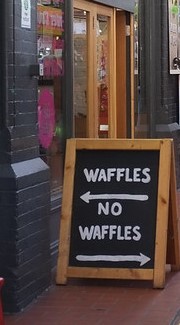|
Home
|
Jan 31, 2022
This week’s themeHomonyms This week’s words waffle taw chum marl grouse 
⟵ Waffles
No Waffles ⟶ Image: Jim MacCormaic Previous week’s theme Anti-words A.Word.A.Day
with Anu GargOne morning the thought came to me that a waffle would be super useful as a Scrabble board while traveling. All tiles stay in place, snug, no matter how quickly the car is ac- or decelerating. Disclaimer: I do not recommend playing Scrabble on a waffle in a moving car, unless you have a CHAUFFEUR or a TESLA. You might think an UBER would work too, but no, it won’t. I checked. Anyway, I started thinking about waffles. What did this crispy, griddy thing do to deserve being turned into a negative verb? Maybe it couldn’t make up its mind on how crispy it wanted to be when it grew up? Or it kept giving smarmy and syrupy speeches about its fine taste. Then I learned that waffle the noun has nothing to do with waffle the verb. These are two separate words with different origins. Two different words, same spelling and same pronunciation. The two are homonyms. Even though this is 2022 and even though we have cast off many of the biases and prejudices in the past where they belong, some churches still frown upon homonyms. We respect all words, always have, irrespective of their orientations. The noun waffle and the verb waffle want to lie next to each other? Fine with us! What they do in the privacy of the pages of the OED is entirely their business. This week we’ve picked five homonyms to share with you. May be more precise to say five pairs (or triads) of homonyms. Homophone: Same pronunciation, different spelling (aisle, isle, I’ll) Homograph: Same spelling, different pronunciation (polish, Polish) Homonym: Same pronunciation and spelling, different meaning waffle
PRONUNCIATION:
USAGE:
“Patrons had paid up to $1875 to hear the big man one last time.
[Pavarotti] had been contracted to sing two performances of ‘Tosca’;
he arrived in New York, sang the dress rehearsal, and came down with
what was described as ‘influenza’. On both nights, he waffled, said
no, said yes, then cancelled shortly before the curtain went up.” Alex Ross; Journey’s End; The New Yorker; May 27, 2002. “Brexit was always a bundle of contradictions held together by a shared hostility to the EU and a vague optimism about freedom. Mr [Boris] Johnson’s taste for waffle and fudge made him the perfect leader of the movement as long as it was about protest.” Tidying Boris Up; The Economist (London, UK); Dec 5, 2020. See more usage examples of waffle in Vocabulary.com’s dictionary. A THOUGHT FOR TODAY:
To bear up under loss, to fight the bitterness of defeat and the weakness
of grief, to be victor over anger, to smile when tears are close, to resist
evil men and base instincts, to hate hate and to love love, to go on when
it would seem good to die, to seek ever after the glory and the dream, to
look up with unquenchable faith in something evermore about to be, that is
what any man can do, and so be great. -Zane Grey, author (31 Jan 1872-1939)
|
|
Subscriber Services
Awards | Stats | Links | Privacy Policy
Contribute | Advertise
Awards | Stats | Links | Privacy Policy
Contribute | Advertise
© 1994-2026 Wordsmith